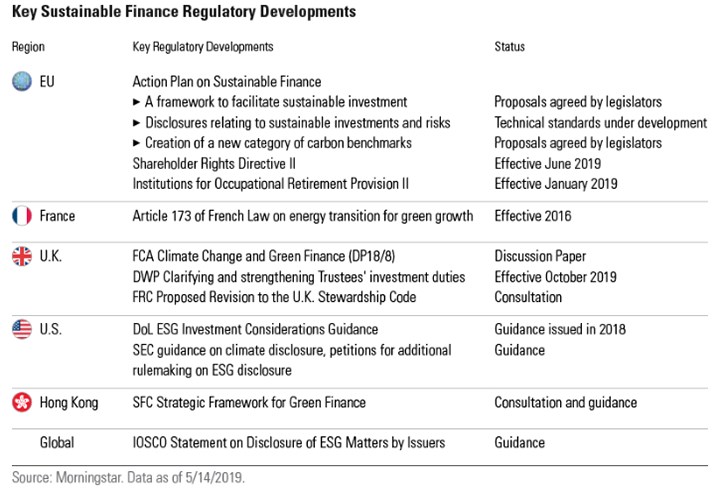
The growing focus on climate change is being matched in the world of financial regulation. In the weeks after we shared the baseline report, “The Evolving Approaches to Regulating ESG Investing,” two separate groups announced significant developments in their climate plans: On June 18, the European Commission (“EC”) released the next steps of its Sustainable Finance Action Plan, and on July 2, 2019, the UK government released its Green Finance Strategy.
Here, we break down what these regulations look like.
New Disclosure Guidelines
The latest addition to the EC’s Sustainable Finance Action Plan includes guidelines on corporate climate-related information reporting. These guidelines are intended to support the entities subject to the EU Non-Financial Reporting Directive - including large listed companies, banks, and insurers - but not other financial-sector companies such as asset managers or pension funds.
These guidelines call for consideration of both the effects a company has on climate and the impact of climate on the company. They require disclosures in five areas:
- Business model
- Policies and due diligence
- Policy outcomes
- Principal risks and their management
- Key performance indicators
Also embedded into the guidance is some of the most advanced work on disclosures from the Task Force on Climate-related Financial Disclosures (“TCFD”).
We believe that good disclosure is a foundational requirement for ESG investment. The more consistent and structured these disclosures are, the better it will be for investors to make informed decisions.
The Green Finance Strategy
The main thrust of the UK’s Green Finance Strategy is to encourage the financial sector to take an increased role in environmental protection and enable the UK to reach its target of net zero greenhouse-gas emissions by 2050.
Additionally, the government is committing to at least matching the ambition of the Sustainable Finance Action Plan’s key objectives, regardless of the outcome of Brexit. In order to do so, they’re ensuring that climate and environmental factors are integrated into mainstream financial decision-making across all sectors and asset classes.
Also in the spirit of international consistency, the Green Finance Strategy includes the expectation that listed companies will disclose in line with TCFD recommendations by 2022. This expectation could be made mandatory after a new taskforce of U.K. regulatory bodies examines the most effective ways to approach disclosure more broadly.
The UK strategy also includes future discussions with international standard setters to promote internationally consistent disclosure.
The table below - a selection of individual pieces of regulatory activity, at varying stages of implementation- illustrates the range of policy and regulatory activity under way around the world.

Perhaps indicative of the amount of policy-setting these initiatives will require in the coming years, the Green Finance Strategy also includes working with the University of Oxford to create a short course for government officials that will provide foundational knowledge on green finance. More broadly, the government launched a Green Finance Education Charter to help build green-financing skills across banking, financial, and professional service skills.
The strategy goes on to provide a number of joint public and private partnership funds to pursue practical green developments. For instance, targets include:
- Upgrading as many homes as possible to Energy Performance Certificate Band C by 2035 and supporting lenders in evaluating the EPC performance of their portfolio of loans.
- Making available £5 million of funding to the private sector to pilot new products such as green mortgages.
- Making available up to £200 million, to be matched by private investors, to expedite the rollout of charging infrastructure.
Additionally, to gain better insight into the public’s views on ethical, responsible, and impactful investment practices, the government is running a survey of 6,000 people on their values, awareness, interest, and barriers to action.
Morningstar’s Investor Success Project has also conducted related research on understanding who makes up today’s ESG investors.




























